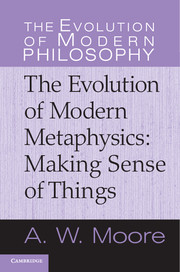Book contents
- Frontmatter
- Contents
- Preface
- Introduction
- Part One The Early Modern Period
- Part Two The Late Modern Period I
- Part Three The Late Modern Period II
- Chapter 15 Nietzsche
- Chapter 16 Bergson
- Chapter 17 Husserl
- Chapter 18 Heidegger
- Chapter 19 Collingwood
- Chapter 20 Derrida
- Chapter 21 Deleuze
- Conclusion
- Bibliography
- Index
Chapter 20 - Derrida
Metaphysics Deconstructed?
from Part Three - The Late Modern Period II
Published online by Cambridge University Press: 05 June 2012
- Frontmatter
- Contents
- Preface
- Introduction
- Part One The Early Modern Period
- Part Two The Late Modern Period I
- Part Three The Late Modern Period II
- Chapter 15 Nietzsche
- Chapter 16 Bergson
- Chapter 17 Husserl
- Chapter 18 Heidegger
- Chapter 19 Collingwood
- Chapter 20 Derrida
- Chapter 21 Deleuze
- Conclusion
- Bibliography
- Index
Summary
A Foretaste
At the end of each of the two previous chapters I adverted to the important difference that it can make, in the most general attempt to make sense of things, if the sense concerned need not be propositional, if the aim of the exercise need not be to produce true declarative sentences, as in the sciences, but to produce something closer to artwork. I urged that Collingwood would have done well to acknowledge this possibility and that Heidegger may have shown in his practice that he did acknowledge it, however unself-consciously. But it was Chapter 9 that provided the model. The maximally general sense-making in which the early Wittgenstein was engaged was non-propositional, and the way in which he tried to convey it was through a creative use of nonsense.
Wittgenstein was still using language however. He may not have been intending to produce true declarative sentences, but he was still affecting to do so. The sense that he was trying to convey may not have been linguistic, but his medium was. (Similarly in Heidegger’s case.) This chapter will provide a further indication of how linguistic resources might be used to convey non-propositional sense.
- Type
- Chapter
- Information
- The Evolution of Modern MetaphysicsMaking Sense of Things, pp. 512 - 541Publisher: Cambridge University PressPrint publication year: 2011

